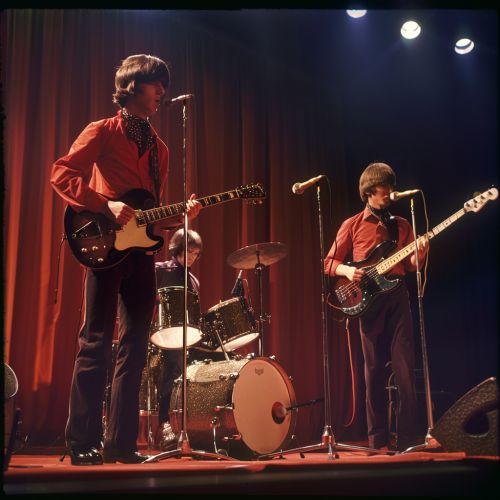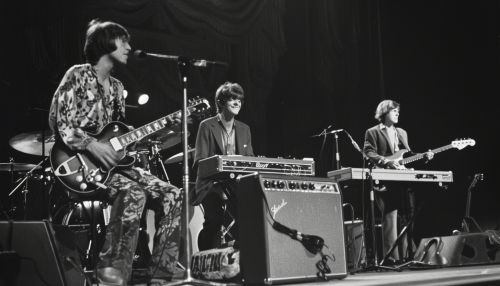The Byrds
History
The Byrds were an American rock band formed in Los Angeles, California, in 1964. The original lineup consisted of Jim McGuinn (later known as Roger McGuinn), Gene Clark, David Crosby, Chris Hillman, and Michael Clarke. The band was pivotal in the development of several music genres, including folk rock, psychedelic rock, and country rock. They are best known for their distinctive jangly guitar sound, harmonized vocals, and innovative use of studio effects.


Formation and Early Years (1964-1965)
The Byrds were formed when Jim McGuinn, Gene Clark, and David Crosby began performing together in Los Angeles. They were initially influenced by The Beatles and Bob Dylan, blending folk music with rock and roll. Their breakthrough came with the release of their cover of Dylan's "Mr. Tambourine Man" in 1965, which became a number one hit on both the Billboard Hot 100 and the UK Singles Chart. This success marked the beginning of the folk rock movement.
Classic Lineup and Folk Rock Era (1965-1967)
The band's debut album, "Mr. Tambourine Man," was released in 1965 and featured a mix of covers and original compositions. The album's success established the Byrds as a leading force in the emerging folk rock genre. Their follow-up album, "Turn! Turn! Turn!" (1965), continued in a similar vein, with the title track becoming another hit single.
During this period, the Byrds were known for their innovative use of 12-string Rickenbacker guitars, which gave their music a distinctive jangly sound. They also experimented with vocal harmonies and studio effects, such as flanging and reverb, which added depth and texture to their recordings.
Psychedelic Rock and Lineup Changes (1967-1968)
In 1966, the Byrds released "Fifth Dimension," an album that marked a shift towards psychedelic rock. The album featured the hit single "Eight Miles High," which is often cited as one of the first psychedelic rock songs. The band's experimentation with psychedelia continued on their next album, "Younger Than Yesterday" (1967), which included the hit "So You Want to Be a Rock 'n' Roll Star."
However, internal tensions and creative differences led to lineup changes. Gene Clark left the band in early 1966, and David Crosby was fired in late 1967. Chris Hillman and Michael Clarke also departed, leaving McGuinn as the sole original member.
Country Rock and Later Years (1968-1973)
With the addition of new members, including Gram Parsons, the Byrds shifted towards country rock. Their 1968 album "Sweetheart of the Rodeo" is considered a pioneering work in the genre, blending traditional country music with rock elements. Parsons' influence was significant, although he left the band shortly after the album's release.
The Byrds continued to evolve, releasing several more albums with varying degrees of success. Notable releases include "The Ballad of Easy Rider" (1969) and "Untitled" (1970). Despite numerous lineup changes, the band maintained a consistent sound and continued to tour until their disbandment in 1973.
Musical Style and Influence
The Byrds' music is characterized by its blend of folk, rock, and country elements. Their use of jangly 12-string guitars, harmonized vocals, and innovative studio techniques set them apart from their contemporaries. They were also known for their eclectic approach, incorporating elements of jazz, raga rock, and electronic music into their recordings.
The band's influence extends across multiple genres. They are credited with helping to popularize folk rock and psychedelic rock, and their work in the late 1960s laid the groundwork for the country rock movement. Artists such as Tom Petty, R.E.M., and Wilco have cited the Byrds as a major influence on their music.
Legacy
The Byrds' impact on popular music is significant. They were inducted into the Rock and Roll Hall of Fame in 1991, and their songs continue to be covered by contemporary artists. The band's innovative approach to music production and their willingness to experiment with different genres have cemented their place in rock history.
Despite their relatively short career, the Byrds' contributions to music are enduring. Their pioneering work in folk rock, psychedelic rock, and country rock has left a lasting legacy, influencing countless musicians and shaping the direction of popular music.
